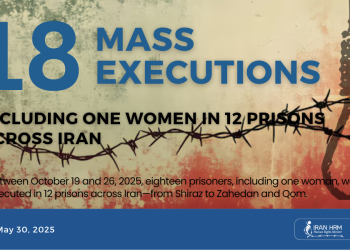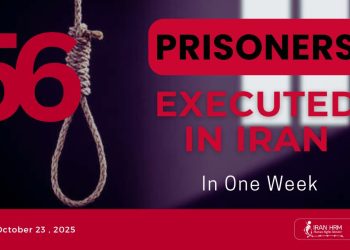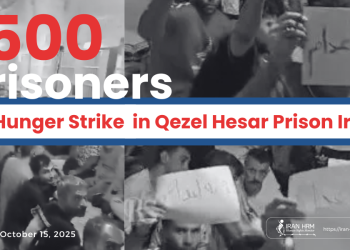Hossein-Ali Nayyeri, a senior Iranian judge and head of the “Death Committee” responsible for the mass executions of political prisoners in the summer of 1988, has died at the age of 69. His death was confirmed on Thursday, April 3, 2025, but state media did not disclose the cause.
Nayyeri was a central figure in Iran’s judiciary for over four decades, holding senior positions including head of the Special Courts under Article 49 of the Constitution, head of the High Disciplinary Court for Judges, and advisor to the Chief of the Judiciary. However, his most infamous and controversial role remains his leadership in the 1988 prison massacres.
Nayyeri’s Role in the 1988 Mass Executions
In the summer of 1988, following a secret fatwa issued by Ayatollah Ruhollah Khomeini, thousands of political prisoners —most of whom had already been convicted and were serving their sentences— were executed after brief, opaque proceedings that violated international standards of due process. These executions were carried out by a committee later known as the “Death Committee,” consisting of Hossein-Ali Nayyeri (then Sharia Judge), Morteza Eshraghi (then Tehran Prosecutor), Ebrahim Raisi (then Deputy Prosecutor), and Mostafa Pourmohammadi (then Ministry of Intelligence representative at Evin Prison). Nayyeri presided over the committee.
The committee’s mission was to “cleanse” prisons of political and ideological prisoners. In short and deadly interrogations, prisoners were asked questions such as, “Are you still loyal to your organization or party?” and “Do you pray?” Answers that did not align with the Islamic Republic’s ideology often resulted in immediate execution.
Most victims were members or supporters of the People’s Mojahedin Organization of Iran (PMOI/MEK) and leftist groups. Many were re-tried and executed while still serving existing sentences. The bodies were buried in mass graves, often in undisclosed locations—many of which remain unknown to this day.
A Long Record of Repression
Nayyeri’s name has long been associated with political repression in Iran. Beyond Iran’s borders, he has been identified by international legal proceedings as a key perpetrator of state crimes. During the trial of Hamid Nouri in Stockholm—himself accused of involvement in the 1988 killings—Nayyeri was repeatedly mentioned by prosecutors as a principal figure.
In 1988, Ayatollah Hossein-Ali Montazeri, then the designated successor to Supreme Leader Khomeini, condemned the actions of the Death Committee in a meeting whose audio recording was later leaked. He accused Nayyeri and others of committing “the greatest crime in the history of the Islamic Republic,” warning, “History will record your names as criminals.”
Implicated in the Chain Murders
In addition to his leading role in the 1988 executions, Nayyeri’s name has also surfaced in connection with the “chain murders” of the 1990s, during which political activists, writers, and intellectuals were mysteriously assassinated. While no official inquiry has held him accountable, reports indicate that he played a decision-making role in those cases.
Continued Power Despite Controversy
Despite his extensive record of involvement in human rights violations, Nayyeri remained a key figure in the judiciary until his death. He continued to head the Special Courts under Article 49, tasked with the confiscation of property belonging to political dissidents, and served as a senior advisor to the Chief Justice—responsible for overseeing the qualifications and performance of judges.
Over time, as international pressure on Iran’s human rights record mounted, Nayyeri became one of the figures considered internationally prosecutable. His death marks the disappearance of one of the leading architects of political repression during the 1980s, though the memory of his actions lives on among survivors and human rights defenders.
Closure for Some, but Justice Still Demanded
Inside Iran, government officials praised Nayyeri as a loyal servant of the Islamic Republic. Judiciary Chief Gholam-Hossein Mohseni Ejei issued a statement of condolence, describing Nayyeri as someone who “dedicated many years to serving the Islamic Republic.”
However, responses on social media sharply contrasted the official narrative. Many Iranian users referred to him as a “criminal,” and his death was widely seen as a moment to revisit and condemn the state-led atrocities of 1988.
Although Nayyeri’s death may mark the formal closure of his personal record, the scars of the 1988 mass executions remain. Families of the victims, survivors, and human rights advocates continue to demand truth, accountability, and justice for what remains one of the darkest chapters in the Islamic Republic’s history.







